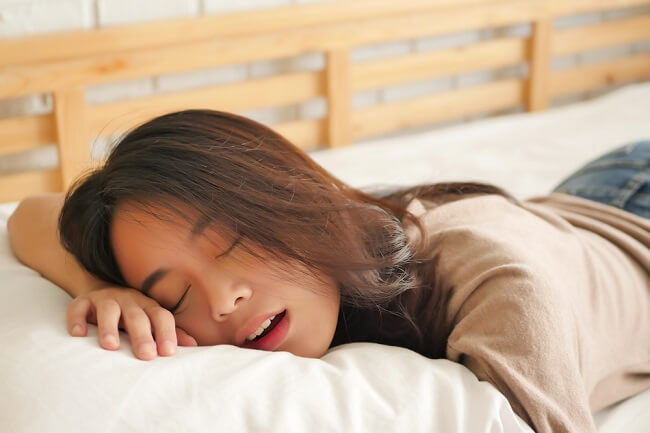3 Simple Tips To Overcome Saliva While Sleeping
Eating accidental saliva during sleep or drooling is often considered an embarrassing habit. Especially if it happens in public places, such as on the bus or on the train. If you often drool while sleeping, yuk find out how to cope!
Although sometimes embarrassing and may seem disturbing, drooling while falling asleep is actually still categorized as a normal thing. This condition can happen to anyone, including infants and the elderly. Especially in infants, the habit of drooling during sleep occurs because they have not been able to control the muscles around his mouth. While in adults, there are some things that are known to cause drooling during sleep.

Causes of Sleeping While Sleeping
Before overcome the habit of drooling, you'll want to know what are the factors causing drool during sleep. Tooth decay and infection of the oral cavity may be one of the causes of drooling during sleep, since generally in this condition saliva production will increase as a body response to infection. Pregnancy can also cause you to more often drool during sleep, and will decrease again after your baby is born. In addition to these two things, there are several other factors that cause sleeping disorders, among others:
- Sleeping position
In the dark condition, you may not realize when your sleeping position is changing and sideways. The sideways sleeping position makes the saliva in the mouth flow out easily. - Gastric acid
Stomach acid disease (GERD) causes some acid stomach to flow back into the esophagus. People with this disorder often drool excessively during sleep.
- Nasal stuffiness
If the nose is blocked during sleep, you are forced to breathe through your mouth. Well, when the mouth is open to breathe, the saliva will flow easily out of the mouth.
- Sleep disorder
Sleep apnea makes your sleep uncomfortable because you will stop breathing for a while while sleeping. This sleep disorder can also cause saliva out of the mouth.
- Drug side effects
Drooling during sleep can be triggered by the consumption of drugs, such as antipsychotic drugs, drugs for Alzheimer's disease, as well as some types of antibiotics.
- Oral muscle disorders
The release of saliva during sleep can also be caused by abnormalities or disorders of the muscles and nerves around the mouth. This causes the muscles around the mouth to weaken, resulting in increased saliva production and difficulty swallowing. This condition can occur for example in people with stroke, ALS, cerebral palsy, Down syndrome, autism, to Parkinson's disease.
Tips Overcoming Sleep while Sleeping
not dangerous, the habit of drooling should be stopped immediately. In addition to disturbing comfort while you sleep, this habit can also make you not confident, especially if seen others.
There are several ways you can do to overcome drooling during sleep, including:
- Changing the sleeping position
The simplest way to stop sleeping habit is to change your sleeping position. If you are used to sleeping sideways, make it a habit to sleep in a supine position. Supine position can help control the saliva in the mouth so as not to flow out. For people with GERD, you can sleep with a couple of pillows on the back to position the head higher, thus preventing stomach acid rising into the esophagus.
- Expand drinking water
By drinking more water, you will keep your body especially the mouth well hydrated. This will help reduce saliva production so it is not excessive. In addition, sucking orange or lemon, also believed to reduce excessive saliva production.
- Maintaining oral hygiene
Maintaining oral hygiene can help prevent drooling during sleep. To keep your mouth clean and healthy, always try to avoid smoking, restrict sweet or sour foods, and do not forget to always brush your teeth before going to sleep.
If your habit of drooling can not be handled in a simple way above, seek medical help immediately. In conditions where saliva production is excessive due to overactive salivary work, doctors may inject botox to the salivary glands to decrease saliva production. In addition, surgery may also be done to remove the problematic salivary glands.
Drooling may seem trivial, but it's good to consult a doctor to see what the underlying cause is. So, you can get the appropriate treatment if needed, so you no longer need to feel inferior because of this.